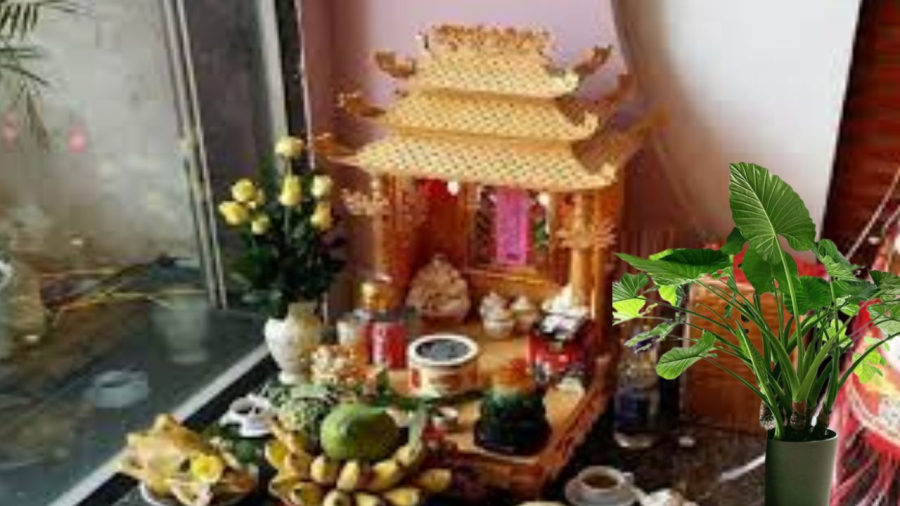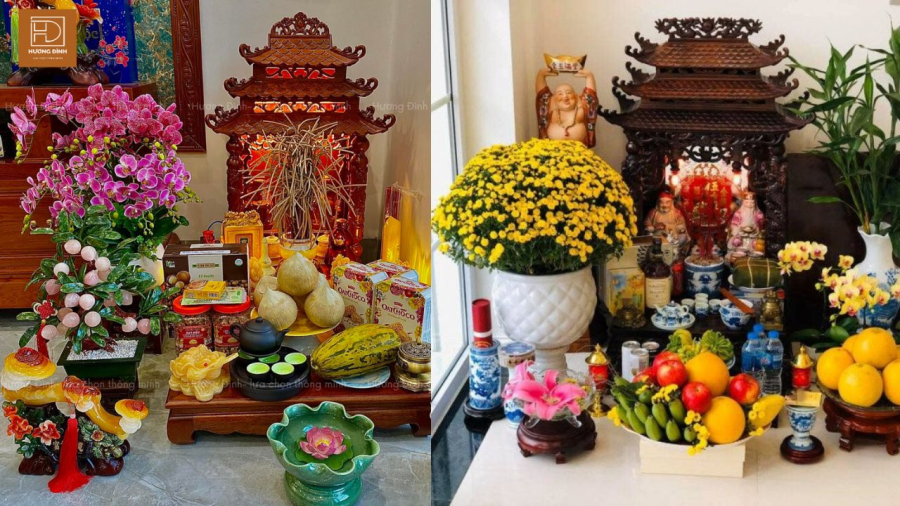What is the Significance of Placing a Wealth God Altar on the Ground?
The practice of worshipping the Wealth God is a belief in seeking good fortune and praying for the god’s assistance in one’s business ventures, attracting more customers and profits.
You will notice that the Wealth God altar is placed on the ground near the entrance. In contrast, ancestral altars or Buddhist shrines are typically elevated and located in a quiet, respectful area.
The general principle for the Wealth God altar is that it should not be hung high but should be at a level where one can observe the comings and goings of people. It needs to be placed near a busy area with high foot traffic and close to the door. Ideally, the altar should be grounded and placed on the first floor of a house or shop, either near the main entrance or on the balcony.

Wealth God Altar on the Ground
According to the legend of the Wealth God, Au Minh, a businessman, was gifted a maid named Nhu Nguyen by the Water God during a trip across the lake. Au Minh’s business prospered with Nhu Nguyen in his household, but his fortune took a turn for the worse when he angrily struck her, causing her to hide in a pile of garbage. The tale goes that Nhu Nguyen was the Wealth God, and thus, the altar should be grounded and placed in a corner to accommodate the god. While the altar should be grounded, the area must also be kept clean and free from dampness or mold.
Moreover, the purpose of worshipping the Wealth God is to invoke the god’s power to attract customers for the household. Therefore, the Wealth God altar should be placed in a busy area with high foot traffic. By placing it near the entrance, the Wealth God can observe and connect with customers, bringing more business opportunities.
Hanging the Wealth God altar high up or placing it on an upper floor is akin to hindering the god’s ability to attract customers. In business, customer interaction is key to securing deals and generating revenue. Thus, placing the altar on an upper floor of a company building would be considered “losing luck,” and such an act might even be seen as disrespectful to the god.

Avoid Placing the Wealth God Altar on Upper Floors
Notes on Worshipping the Wealth God
Choose the Right Direction for the Altar: In feng shui, the direction of the altar is crucial. It is advisable to choose the northwest direction (representing the Nobleman star, bringing peace and good luck), the southeast direction (representing the Star of Wealth, attracting monetary luck), or the direction of the four best constellations (Heavenly Doctor, Prosperity, Longevity, and Position). Selecting the right direction for the Wealth God altar helps attract wealth and brings more luck to the family.
Avoid placing the altar below or directly across from a mirror, toilet, sink, or area with bright lights. These locations can contaminate the Wealth God’s energy and affect its spiritual power. Additionally, it is best not to place the Wealth God altar next to ancestral or Buddhist altars to avoid spiritual conflicts.
Arrange the Offerings Properly: According to ancient customs, when facing the altar from the outside, place a flower vase on the right and a fruit offering on the left. This arrangement is known as “east flower, west fruit.” Flowers associated with luck, such as roses, money plants, and chrysanthemums, are preferred. However, lilies, orchids, peonies, and porcelain flowers should be avoided. It is essential to keep the Wealth God altar clean and free from dust, and fresh offerings should always be used.
Burn Incense Daily to Gather Qi: For business owners, it is recommended to burn incense every morning before opening for business and in the evening after closing. This practice helps to gather positive energy and blessings for the day ahead and to express gratitude for the day’s successes.
Worship with Beans and Garlic: A unique aspect of this worship practice is the offering of a jar of five types of beans or a plate of garlic. These items are considered lucky and are specifically used for the Wealth God altar, whereas other altars may refrain from using them.
This information is for reference only.
“Don’t Let These Flower Vases Take Away Your Luck: A Guide to Avoiding Common Home Decor Mistakes”
Introducing the world of floral offerings with a twist – a guide to navigating the dos and don’ts of flower arrangements for ceremonial purposes. Uncover the hidden meanings behind these vibrant blooms and avoid potential pitfalls with a simple yet transformative twist. Prepare to immerse yourself in a journey of cultural significance and aesthetic appeal, where every petal unfolds a story and each arrangement speaks volumes.



































